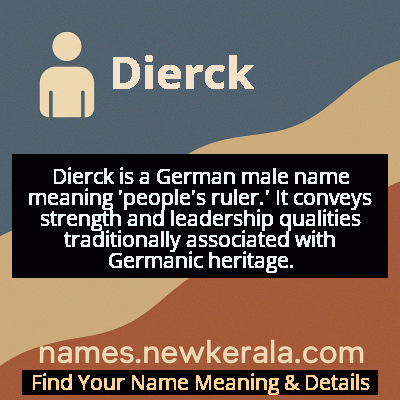Dierck Name Meaning & Details
Origin, Popularity, Numerology Analysis & Name Meaning of Dierck
Discover the origin, meaning, and cultural significance of the name DIERCK. Delve into its historical roots and explore the lasting impact it has had on communities and traditions.
Name
Dierck
Gender
Male
Origin
German
Lucky Number
5
Meaning of the Name - Dierck
Dierck is a German male name meaning 'people's ruler.' It conveys strength and leadership qualities traditionally associated with Germanic heritage.
Dierck - Complete Numerology Analysis
Your Numerology Number
Based on Pythagorean Numerology System
Ruling Planet
Mercury
Positive Nature
Adventurous, dynamic, curious, and social.
Negative Traits
Restless, impatient, inconsistent, prone to indulgence.
Lucky Colours
Green, white.
Lucky Days
Wednesday.
Lucky Stones
Emerald.
Harmony Numbers
1, 3, 9.
Best Suited Professions
Sales, marketing, travel, entertainment.
What People Like About You
Versatility, charisma, adventurous spirit.
Famous People Named Dierck
Dierck Bormann
German actor
Known for his work in German theater and television productions
Dierck Hillert
German conductor
Renowned orchestral conductor and music director
Dierck Pestre
German businessman
Prominent figure in German automotive industry
Name Variations & International Equivalents
Click on blue names to explore their detailed meanings. Gray names with will be available soon.
Cultural & Historical Significance
The name carries echoes of medieval Germanic society where strong leadership was valued and respected. In modern German-speaking regions, Dierck maintains its traditional character while representing a connection to cultural heritage and historical continuity. The name's persistence through centuries demonstrates its enduring appeal and the value placed on its symbolic meaning within German cultural identity.
Extended Personality Analysis
Individuals named Dierck are typically perceived as strong, reliable leaders with natural authority and organizational skills. They often exhibit determination, practical intelligence, and a sense of responsibility toward others, living up to the name's meaning of 'people's ruler.' These individuals tend to be methodical in their approach to challenges and demonstrate loyalty to their communities and families.
Their leadership style is often characterized by fairness and a genuine concern for the well-being of those they lead. While they can be decisive and firm when necessary, they typically balance this with compassion and a strong moral compass, making them respected figures in both professional and personal contexts. The name suggests someone who takes their responsibilities seriously and approaches life with purpose and integrity.
Modern Usage & Popularity
In contemporary times, Dierck remains primarily used in German-speaking countries, particularly in northern Germany where it maintains traditional appeal. While not among the most popular names in modern Germany, it continues to be chosen by parents seeking a strong, historically significant name with authentic Germanic roots. The name has seen stable but modest usage over recent decades, often favored by families with strong regional ties or those appreciating traditional German names. Its usage patterns show it's more common in rural and traditional communities than in urban centers, where more international names have gained popularity.
Symbolic & Spiritual Meanings
Symbolically, Dierck represents leadership, strength, and community responsibility. The name carries connotations of protection, guidance, and traditional values, embodying the ideal of a leader who serves their people with integrity and wisdom. It symbolizes the bridge between individual strength and collective well-being, suggesting a person who can balance personal ambition with communal needs. The name also represents cultural continuity and connection to Germanic heritage, serving as a living link to historical traditions and values that have shaped German-speaking societies for centuries.

